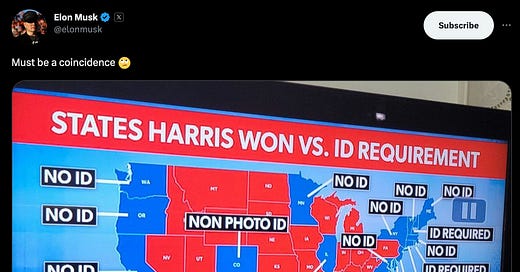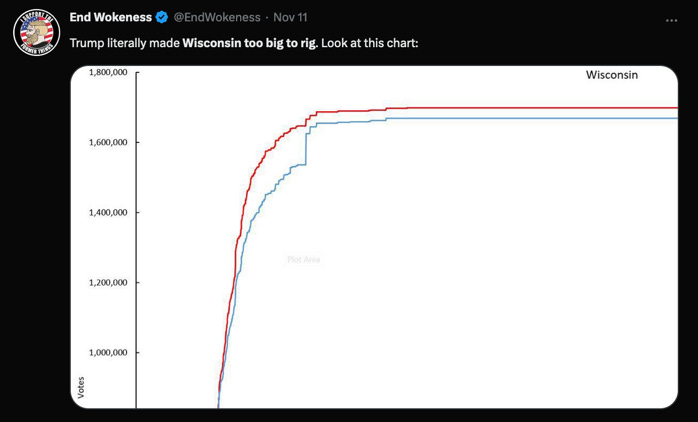Who are You? Voter ID law and election integrity should be top priority in new Congress.
Voters want it, and with good reason.
Who are you? Who who, who who? I really wanna know.
Okay, that’s from – appropriately enough – The Who, but it’s also a reasonable question to ask regarding voters. Elon Musk tweeted the below the other day:
Now maybe this doesn’t mean anything. Perhaps opposition to voter ID is just an article of faith in blue states, and unsurprisingly they also vote blue. Maybe.
But maybe not. Making voters show photo ID seems intuitively likely to reduce fraud, as it makes it harder for people to pretend to be someone else. Maybe it’s people pretending to be other voters to get another vote; maybe it’s people pretending to be voters who are dead or inactive in order to get another vote, but making people show a trustworthy photo ID when voting makes such fraud much more difficult.
At any rate, the GOP should make a national photo ID requirement for federal elections a top priority in the next Congress. And it should go further.
There are other tools, used in countries we’ve liberated but not in our own country, like dyeing people’s fingers purple so they can’t vote more than once. And of course, maintaining trustworthy voter rolls, so that when someone shows up claiming to be entitled to vote, there’s good reason to believe that they actually are. If a person shows up with a photo ID, and it matches a person who is entitled to vote, the odds are very good that they are who they say they are, and they are entitled to vote.
Rules in other countries are generally stricter than what prevails in the United States,as this summary from RealClearPolitics illustrates:
Seventy-four percent of European countries entirely ban absentee voting for citizens who reside domestically. Another 6% limit it to those hospitalized or in the military, and they require third-party verification and a photo voter ID. Another 15% require a photo ID for absentee voting.
Similarly, government-issued photo IDs are required to vote by 33 nations in the 37-member Organistion for Economic Co-operation and Development (which has considerable European overlap). Only the UK, Japan, New Zealand, and Australia currently do not require IDs. Of those outliers:
Japan provides each voter with tickets that bear unique bar codes. If the voter loses the ticket or accidentally brings the ticket for another family member, polling staff verifies the voter’s name and address using a computer with access to the city’s database. The voter may have to present government-issued photo identification.
New Zealand technically requires an ID with a unique code, but while it will take longer to look up identifying information, it is still possible to vote without the ID.
Australia has by far the loosest rules, and while a photo ID is required to register to vote, once at a polling station, voters need simply report their names, addresses, and whether they have voted in a previous election. . . .
In some countries, even driver’s licenses aren’t considered authoritative enough forms of voter identity verification. The Czech Republic and Russia require passports or military-issued IDs and others use national identity cards. Others go even further: Colombia and Mexico each require a biometric ID to cast a ballot.
Many countries in Europe and beyond have learned the hard way that fraud can result from looser voting regimes -- and they have instituted stricter voting measures in direct response to it.
In the United States, of course, even basic safeguards are wildly controversial among Democrats. The photo ID requirement, for example, though consistently upheld by courts, is always denounced in the press as racist and claimed to be unconstitutional. But it’s also favored by huge majorities of, you know, actual voters. “Majorities of Republicans and Democrats favor early voting as well as requiring a photo ID to vote, although large party gaps exist on these as well. Having an early-vote option for all voters is backed by virtually all Democrats (95%) as well as 60% of Republicans, while requiring all voters to show photo ID is supported by 97% of Republicans and 53% of Democrats. Independents' views fall about halfway between Democrats and Republicans on most of the policies tested. However, independents' 84% support for photo identification is significantly closer to Republicans' level of support than to Democrats'.”
Getting a national photo ID requirement, as well as requiring states to keep voter rolls up to date, and to count votes openly and transparently, would go a long way toward restoring confidence in the system.
And the “count votes openly and transparently” part needs to be stressed as well, with federal guidelines that require that counts take place under public observation, with not only poll watchers from all parties, but also members of the public, able to observe what is going on, and with everything from voting itself, to the collection and counting and reporting of votes, generating a reliable audit trail. This is the case in some jurisdictions, but manifestly not all. And a reminder that it isn’t enough for the ballots and counting and reporting to be honest – they must be seen to be honest by everyone.
I’ve also argued in favor of the use of paper ballots. It’s certainly possible to commit fraud with paper ballots, but at least they can’t be hacked remotely, and such fraud often leaves traces if they are examined. (This is something I’ve been writing about since 2002.)
Transparency and trustworthiness in counting would eliminate concerns like the Wisconsin double-bump of 2024, in which early-morning additions of Democratic votes weren’t enough to beat Trump, but were enough to outpoll Republican Senate candidate Eric Hovde – and inspired a lot of skepticism in many quarters.
Even if everything here was somehow on the level despite these graphics, the process needs to be such that no reasonable person would suspect fraud. That certainly doesn’t describe the process in Wisconsin now.
Republicans need to push these reforms, which as noted above are popular with voters, as soon as possible, while they control both houses of Congress. Congress has ample authority to do this under the Constitution, and the best time to do it is before tensions begin to build before the next election season, and when states have time to make the necessary changes.
There’s a lot going on already in this new presidency, just a week after Trump was elected. But this should be on the front burner.
[As always, if you like these essays, please take out a paid subscription. It’s much appreciated.]








The only remedy to obvious examples of election fraud, like the Wisconsin jump for the Democrats is for there to be investigations, arrest, trials and imprisonment of people who commit these crimes. Stealing an election is much worse than theft or robbery of money or goods. They rob government of legitimacy and are the precursor to financial fraud on the part of the people put in power by the theft of an election. That's the reason elections are stolen.
You know perfectly why Elias Inc engages in lawfare to stop any voting reforms. It is so they can cheat. Nevada is a blue state that just passed Voter ID overwhelmingly.